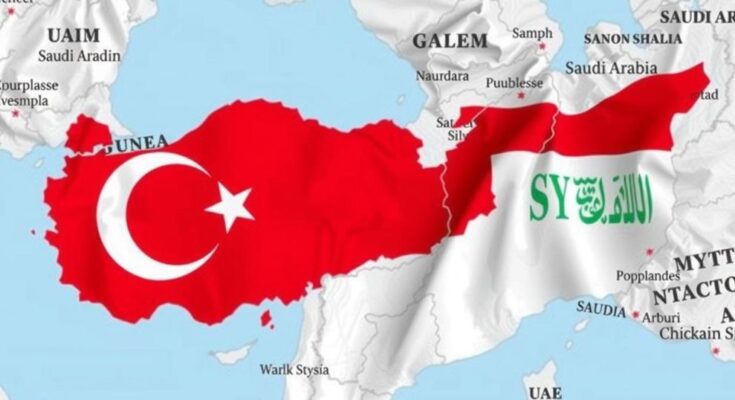Turkey is positioning itself to influence Syria’s future following the collapse of Bashar al-Assad’s regime. Seeking support from Saudi Arabia and the UAE, Turkey aims to prevent past mistakes from the Arab Spring. President Erdogan prioritizes regional stability, emphasizing a neutral and non-threatening Syria amidst ongoing negotiations with international powers.
In the wake of the rapid decline of Bashar al-Assad’s regime in Syria, Turkey is positioning itself as a pivotal influence in determining the nation’s future governance. Turkish officials are strategically seeking collaboration with regional powers such as Saudi Arabia and the United Arab Emirates to avoid repeating the calamitous outcomes of the Arab Spring. President Recep Tayyip Erdogan aims to assure these countries that their apprehensions, particularly regarding the Muslim Brotherhood and related movements, should be taken into account in the shaping of Syria’s administration.
Erdogan’s attendance at an upcoming summit in Cairo emphasizes this intent, as he discusses the implications of the new Syrian government with Egyptian President Abdel Fattah el-Sisi. Sisi shares concerns about the ascension of Hay’at Tahrir al-Sham (HTS) in the region, highlighting Ankara’s complex web of strategic interests that seeks to reconcile both ideological divides and realpolitik.
While Turkey has historically denied direct assistance to HTS, it acknowledges its significant influence over the group. Foreign Minister Hakan Fidan articulated Turkey’s intimate knowledge of HTS, further revealing military support promised by Erdogan for stabilizing Syria. Additionally, Turkey has engaged multiple regional and international stakeholders to advocate for a politically inclusive and representative governance model in Syria, stressing respect for human rights in the process.
A critical aspect of Turkey’s strategy involves establishing a neutral Syria to mitigate threats of terrorism to neighboring states, including Israel and Iran. Turkish officials have explicitly called for Israel to cease its military strikes on Syrian territory, aligning their agenda against Iranian dominance in the region. As Fidan stated, Turkey envisions a cooperative framework among Gulf nations, advocating for mutual respect of national sovereignty to prevent external interferences from worsening tensions in the region.
Turkey’s diplomatic overtures have prompted positive shifts from Gulf states, particularly the UAE, illustrating a growing willingness to support reconstruction in Syria. This necessity for financial backing from the UAE and Western allies underscores the complexity surrounding the recovery efforts, which also depend significantly on the role of Russia. European engagement is anticipated to facilitate vital service restorations within Syria, despite ongoing calls for a strategic Russian withdrawal. Ankara aspires for a collaborative effort involving both Russia and Iran to stabilize Syria, potentially normalizing relations with the HTS-led government.
Thus, Turkey’s dynamic approach to influencing Syria’s emerging political landscape emphasizes the importance of regional alliances, reflecting a broader aim to restore stability while counteracting influences deemed destabilizing.
The ongoing conflict in Syria has undergone drastic changes following the swift decline of Bashar al-Assad’s regime. Turkey, due to its geographical proximity and vested interests, aims to reshape Syria’s governance and stability in collaboration with regional allies. This necessitates a cautious diplomacy informed by past regional upheavals and a strong emphasis on countering terrorism and foreign influence. The complexities surrounding Syria’s future are further heightened by the intricate relationships between regional powers, Western nations, and Russia, each vying for their interests in the post-conflict landscape.
In conclusion, Turkey is strategically cooperating with regional allies, particularly Saudi Arabia and the UAE, to help shape a stable future for Syria following Assad’s regime collapse. Diplomatic dialogues are essential for overcoming mutual concerns, especially regarding groups like HTS, while promoting a neutral governance structure that minimizes external threats. The complexities involved in reconstruction efforts underscore the necessity of diverse regional and international support, particularly as Russia’s significant influence remains a critical factor in the region’s stability.
Original Source: www.middleeasteye.net




